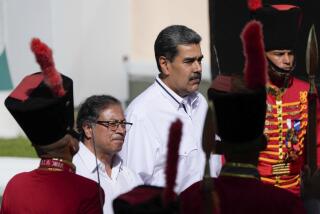Ortega Talks With Opposition on Nicaragua Vote
- Share via
MANAGUA, Nicaragua — Facing demands that he rule out his own candidacy and remove the army from politics, Nicaraguan President Daniel Ortega began meeting with opposition leaders Wednesday to negotiate rules for next year’s elections.
The talks, expected to last several weeks, are the first step taken under a new agreement among five Central American presidents to close Nicaraguan rebel camps in Honduras in exchange for political reforms in Nicaragua.
Ortega’s Sandinista government is obliged under the accord signed last week to hold general elections by Feb. 25, 1990, and to amend its electoral law to assure an open and fair campaign.
Opposition leaders said they will use the talks not only to seek specific changes in that law but also to press for constitutional amendments they consider necessary to compete on an equal footing with the Marxist-oriented government.
One oft-mentioned demand would keep any president from being succeeded by himself or a close relative. This is meant to prevent a new dynasty like the four-decade Somoza family dictatorship that ended with the 1979 Sandinista takeover.
Another demand would turn the Sandinista People’s Army into a “national army” and end the ruling party’s monopoly on political indoctrination among its 85,000 troops.
“If the Sandinistas do not make a clear distinction between the party and the army and the state, they will keep their tremendous advantage,” said Jose Antonio Bonilla, a spokesman for the 14-party opposition bloc. “If the army can vote, other parties should have a right to campaign within its ranks.”
In recent statements, Ortega appeared to reject those demands. Without declaring himself a candidate, he said that “reelection is no crime.” At a Sandinista rally Tuesday night, he accused opposition leaders of seeking “anti-democratic” changes to stack the political process in their favor.
“They put their hopes in the Contras or a Yankee invasion,” Ortega told tens of thousands of supporters. “Now that they are left without those options, they are clinging to (demands for) constitutional reform, because what they want is simply for the people to step back and let them take over.”
Ortega met separately Wednesday with leaders of three parties, starting with Clemente Guido, the Conservative runner-up in the 1984 presidential election. That election was marred by the withdrawal of the main opposition coalition, which charged that the rules favored the Sandinistas.
Before the talks, Ortega hinted at his willingness to make some narrow changes, such as lifting a ban on campaign funding from abroad. His aides said he might also expand the five-seat national electoral council, on which the Sandinistas now have three places, to give a broader range of opposition groups half of the seats.
While the president is obliged by last week’s accord to give each party equal time on state radio and television, some opposition leaders said they will demand a television station of their own.
The five-nation accord calls for international observers to monitor the fairness of the election throughout a four-month political organizing period and a six-month campaign.
That gives Ortega two months to negotiate new election rules before the other four nations must meet their end of the bargain: to draft a plan by mid-May to disarm the idled, U.S.-backed Contra army and close its Honduran sanctuaries.
More to Read
Sign up for Essential California
The most important California stories and recommendations in your inbox every morning.
You may occasionally receive promotional content from the Los Angeles Times.













